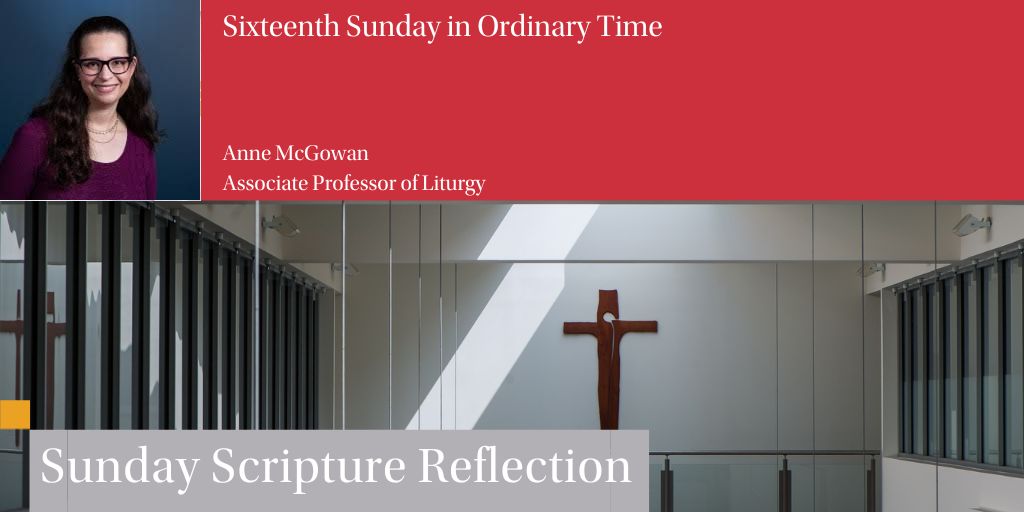

Readings:
Genesis 18:1-10a
Psalm 15:2-3, 3-4, 5
Colossians 1:24-28
Luke 10:38-42
“Why can’t you be more like your sister?” Imagine that Mary heard words like these countless times. Prone, possibly, to getting distracted by the latest person or situation that captivated her attention (yet capable of single-hearted devotion to whatever her focus of the moment was), Mary nonetheless may have gained a reputation as “the flighty sister.” Martha, by contrast, is the hardworking, responsible one. Martha certainly plays that part here, dutifully welcoming this village visitor, Jesus, and the entourage he attracted wherever he went. She strives and struggles to meet needs arising faster than she can comfortably cope, finding herself suddenly in a situation where managing the real and proverbial simmering pots and spinning plates leaves her spiraling out of the comfortable confines of her ability to maintain control over the situation.
Legitimately burdened with much serving, she takes the bold and perhaps personally costly step of asking for help—not from her sister directly, but from Jesus, her guest, who should obviously see what relational dynamics need resetting as Martha’s internal tension with her sister reaches a boiling point. However, not only does Martha not receive the help she hoped for from her sister, but Jesus instead praises Mary while seemingly making an example out of Martha’s neglect! Martha prioritized comfort, care, and probably also cooking for her guests—yet finds herself in a situation where it seems like Jesus does not care about how hard she’s been trying, and neither does her sister! In real-life sibling rivalry situations, a dinner with Martha shamed and seething may have ensued while Mary, vindicated and victorious, dined guilt-free with the guest who finally took her side.
Ministers, mothers (and fathers), and manual laborers can find much to relate to in Martha. How delightful it must be to live with the childlike joy of Mary, who got to spend her days following the immediate desires of her heart! Yet, how well would the world work without those who see clearly the scope of what clamors to be done, who feel its cognitive load keenly, and who more readily shoulder the load of service, both visible and invisible? Even if they sometimes resent the myriad major and minor tasks they feel compelled to continue to completion that, in turn, enable others to enjoy moments of untroubled ease, wouldn’t the world be worse if all the serving they do were left undone?
But what is really cooking here? How is Jesus ministering to both Martha and Mary in this encounter? Jesus, many times in Luke’s Gospel, revels in turning the tables on a situation where he proffers a host’s hospitality even at tables where he arrived as a guest. Mary is immediately attracted to what Jesus identifies as more important (i.e., sitting with and listening to Jesus), and Jesus insists she should continue what she has chosen. Martha, meanwhile, has misdiagnosed the root of her problem, which Jesus, the discerning dinner guest, quickly identifies: Martha is anxious and thus worried about many things all at once. She is utterly incapable of focusing on any one thing! In this state, it is no wonder that her service (which Jesus does not denigrate) feels to her like nothing but a burden. She can’t prioritize effectively or be purposefully present to the critical work of serving God and others that she has chosen this day. Maybe Mary might have helped had she realized how anxious Martha was becoming. However, Jesus recognized that Martha needed more than short-term assistance in this situation; she required a complete reframe of the resources she had been relying on to serve others. Attempting to be constantly attentive to the perceived needs around her is overextending her to a point that she is bound to overreact or underreact. To do what she does well, Martha, too, needs periodic pauses to refresh herself in God’s presence, to delight without doing, to rejoice in her status as beloved by Jesus for who she is, not what she does (or doesn’t) do. Martha will choose what is best for herself when she combines her activity with opportunities for contemplation that ground all her doing in the singular purpose of remaining responsive to Jesus’ invitation to share in the feast that he has prepared for all of us.
We all have “Martha moments” and “Mary moments,” no matter what our state in life or the constellation of our responsibilities—situations where sometimes the call to action is primary and other situations where a need for contemplation takes precedence. Our embodied lives in this world demand contemplation and action since humans thrive only when we receive earthly nourishment and spiritual sustenance. Amid our prayerful attentiveness and purposeful activity, we are also practicing in this life to feast abundantly in the reign of God to come, with Jesus who came not to be served but to serve us fully. Then we will finally have no other responsibility remaining besides the wonder and awe of our unceasing praise.